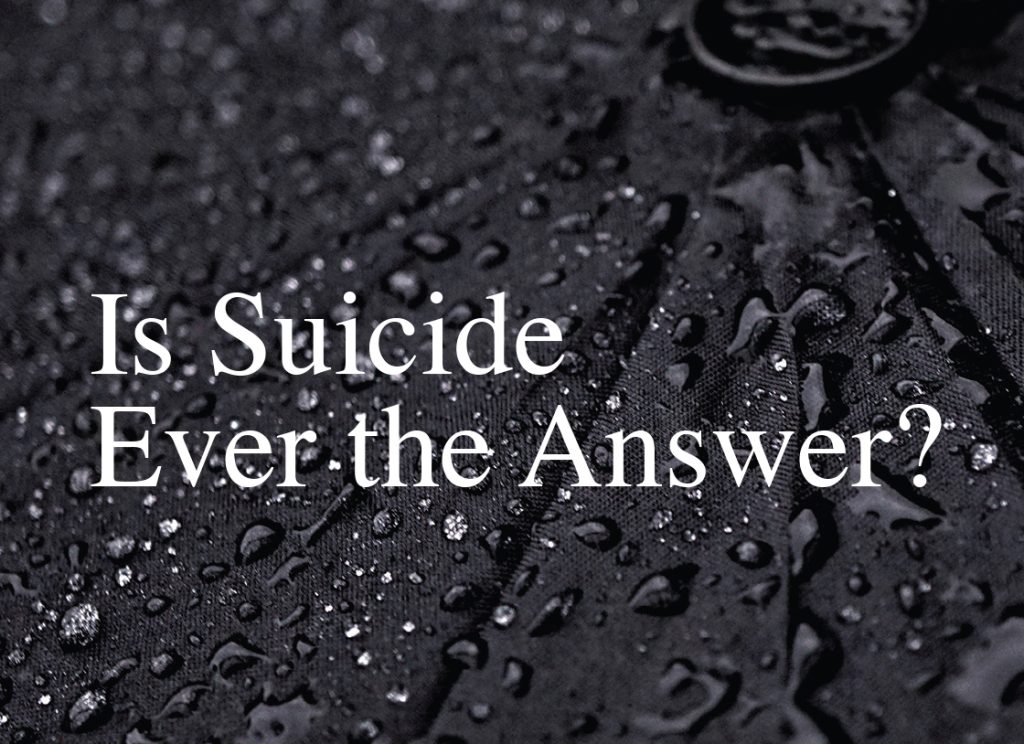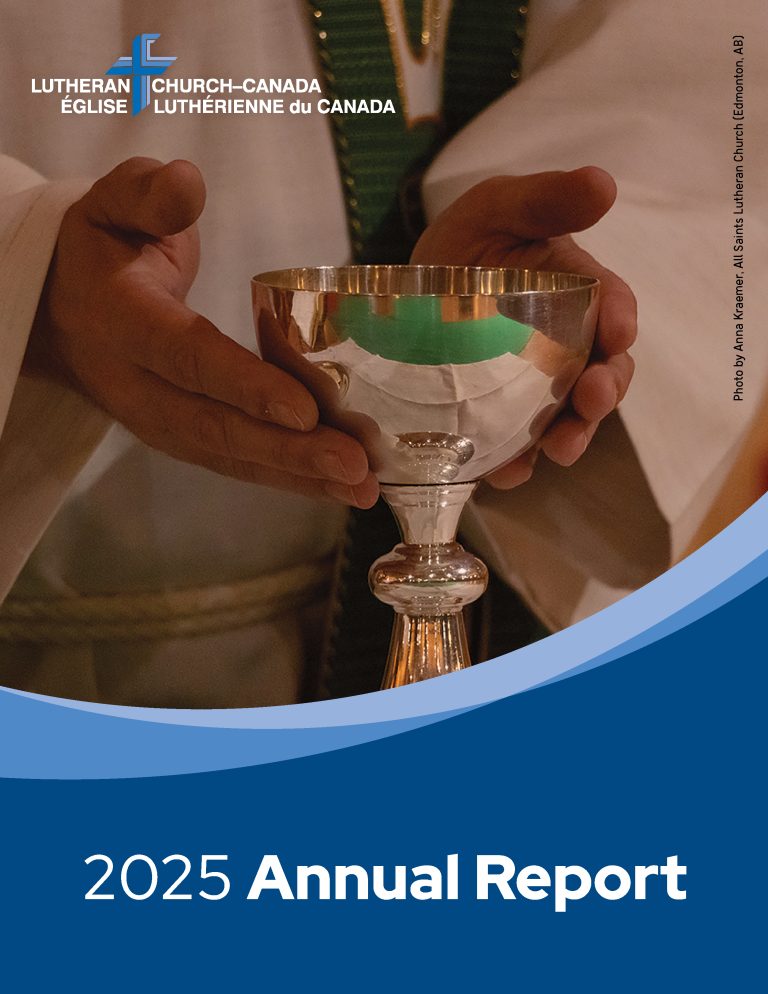Is Suicide Ever the Answer?

by Harold Ristau
Suicide used to be one of the worst imaginable ends to one’s life. As military chaplains, despite all doctrinal difference, this was something that we could all agree upon: Christians do everything within their power to stop a suicide. I have personally “interfered” a number of times in a distraught soldier’s attempt to terminate his life. I have succeeded most of the time. And I have also never had complaint after such intervention. In light of the legalization of assisted suicide in Canada, however, it’s not clear if counselling someone out of suicide will one day become a criminal offense (or at least carry the same social stigma associated with attempts at counselling women out of abortion or those facing gender and sexual confusion).
But it has crossed my mind that suicide intervention might one day become a purported violation of human rights. One idolatrous belief in our rights-based society today is that our bodies belong to ourselves. This is why our government and courts are so adamantly pro-choice on abortion. Assisted suicide is a logical extension of this belief system. After all, if your body belongs to you, then nobody has the right to tell you how to live… or die.
Canada is once again on the cutting edge of anti-Christian public policy. We boast the highest number of medically assisted suicides. Yet are we surprised? With the decline of Christianity in our country comes a decline of hope, faith, and even love for neighbour. Add the increased vulnerability of unbaptized unbelievers to the devil’s attacks and you have a recipe for moral and spiritual tragedy.
Governments and sadly even some mainline Protestant denominations are encouraging “dying with dignity.” Conveniently, this “dignified dying” rids society of those who are no longer “valuable contributors” to the economy or even a “burden” on the health of our health care system. The legal term for the practice is “Medical Assistance in Dying,” abbreviated as “MAiD.” There is some unintentional honesty here. After all, “maids” clean things up. They get rid of messes. The unspoken implication seems to be that the elderly, physically challenged, mentally challenged, and depressed are things from which our society requires sanitization.
The popularity of suicide today for those undergoing trials of all sorts comes down to the belief that there is no value in suffering.
Of course, many people truly believe that MAiD is offered not for selfish reasons but rather out of compassion—merciful Canadians seeking to release people from suffering. But this misplaced mercy confuses who is really in charge of life and death. God is the author of life. He brings us into this world, and He determines when to take us home: “The LORD gave, and the LORD has taken away; blessed be the name of the LORD.” (Job 1:21). Again: “The LORD kills and brings to life” (1 Samuel 2:6). And again: “I kill and I make alive” (Deuteronomy 32:39). Our almighty and Heavenly Father has a purpose for each one of us, even though we may never know what it is until we cross into heaven. And He knows best when that homecoming should take place, not us.
In a sense, then, suicide is theft—and the devil is the thief. Yet we belong to God. We are His possession. Martin Luther explains it eloquently in the Small Catechism: Jesus has “purchased and won me from all sins, from death, and from the power of the devil; not with gold or silver, but with His holy, precious blood and with His innocent suffering and death, that I may be His own and live under Him in His kingdom and serve Him in everlasting righteousness, innocence, and blessedness, just as He is risen from the dead, lives and reigns to all eternity.”
Whereas our Lord Jesus has come that we may “have life and have it abundantly” (John 10:10), MAiD is a devilish agenda that kills. The devil is a murderer. He is also a liar. Indeed, his lies are intended to kill and destroy (John 10:10).
The question underlying the problem of assisted suicide is this: Does your body belong to you or God? As Christians we all know the answer, but sometimes we are reluctant to accept the consequences. Whether it concern questions as to what (and how much) we eat and drink; what kinds of medical care we opt for; the activities we participate in and personal risks we take; decisions regarding sexual activity and orientation; even funeral preparations, wills, and insurance policies—we often behave as if we have divine right over our bodies. We do not always consult the Lord by letting His holy Word govern our choices. None of us is without sin when it comes to how we treat our bodies, which are temples of the Holy Spirit.
God has a purpose for us, and this includes our bodies. There is no such thing as a person without a body. Death, by definition, is the separation of the body from the soul—which is why it is so terrible. It is dreadfully unnatural. And that is why the miracle of the resurrection of Christ is so wonderful. For through His suffering, death, and glorious resurrection we encounter the reversal and restoration of what was once lost.
I recall a young woman in a parish in which I served, who was bound to a hospital bed for more than two years. She lay there day by day, with nothing to do but stare at the fluorescent lights on the ceiling and gaze out the same drab window for hours at a time. Whenever I would visit, she would lament how useless she felt that her life was. What purpose could there possibly be in her suffering? What use was she at all? One day, I said to her: “You undervalue your utility in the Kingdom of God. One thing you do more than others is pray. When you lay here, you pray for the help or salvation of other patients, and the nurses, doctors, and hospital staff. Now imagine if you weren’t here. Who would do that? Who would be there for them? I may be your pastor, but you are truly their priest.” Her eyes lit up and she smiled. “I never thought of it that way!” she said. That didn’t mean she no longer suffered. She did. But now she understood that suffering can have profound spiritual meaning for those who have faith.
The popularity of suicide today for those undergoing trials of all sorts comes down to the belief that there is no value in suffering. This is a temptation of the devil—a temptation that our Lord Himself knew well. During His fasting in the wilderness, the devil tried his best to divert Jesus from pursuing the path to the cross (Matthew 4:1-11). Likewise, when Jesus’ friends sought to prevent His suffering at any cost, Jesus responded: “Get behind me, Satan!” (Matthew 16:23). Even in the Garden of Gethsemane, Jesus begged his Father to take away the cup of suffering (Luke 22:42).
But God is powerfully at work through suffering, not only for your own sake but also for the wider Church and the world around you, as He “works all things according to the counsel of His will” (Ephesians 1:11).
No one wants to suffer. We have a hard time seeing any value in it. Certainly, Jesus’ suffering was unique. But we abide in Him, and He in us (John 15:4), which means we bear the marks of our Lord in our lives, our experiences, and even our bodies (Galatians 6:17). Suffering for the sake of the advancement of the Gospel is natural to the Christian human condition (Galatians 2:20). But God is powerfully at work through suffering, not only for your own sake but also for the wider Church and the world around you, as He “works all things according to the counsel of His will” (Ephesians 1:11). God can transform even the worst kinds of evil for His holy plans.
Suffering hurts. But just as gold is refined in fire, our lives of faith are readied for greater purposes through suffering (1 Peter 1:7). Terminal illness is horrific. Aging is painful. Depression is real. Demonic struggles are authentic. Temptations to suicide, fueled by the devil’s lying whispers, are all too persuasive, even among Christians. As a Church we must take these trials seriously. And we do so by carrying our crosses together (Galatians 6:2) as the Body of Christ that we are. The solution to the darkness of suffering is not to end our lives. Suicide is never the answer. Instead, the Church is in the business of rescuing lives, for all lives are valuable.
That goes for those in wider society too. As Christians, we should pray that our civic leaders would enact laws which respect the sanctity of life. But we can also do more than that. As citizens, Christians have the vocation of encouraging government to behave in God-pleasing ways. This happens in elections, of course, but it can also take place in other ways: reaching out to your elected representatives, signing petitions, peacefully protesting, and exploring legal options are all ways in which you can aid the lives of people for whom our loving Saviour died. We can open our mouths and speak the truth. In our modern age, can we imagine a greater good work than advocating for life, both temporal and eternal?
In the midst of our current darkness, we are called to proclaim Jesus, who is true life and true light: “In Him was life, and the life was the light of men” (John 1:4). Indeed, Jesus says: “I have come into the world as light, so that whoever believes in Me may not remain in darkness” (John 12:46). The darkness of the devil resides in the hearts and minds of the world around us, but we are called to be “the light of the world” (Matthew 5:14). So then, “let your light shine before others, so that they may see your good works and give glory to your Father who is in heaven” (Matthew 5:16).
For more information on life issues, visit Lutherans for Life – Canada (lutheransforlife-canada.ca) and its American counterpart Lutherans for Life (lutheransforlife.org). Additional resources on life issues are available from Lutheran Church–Canada’s website (lutheranchurchcanada.ca/resources/for-life/).
———————
Rev. Dr. Harold Ristau is an Adjunct Professor of Theology with Concordia Lutheran Theological Seminary (St. Catharines, Ontario), currently deployed with Lutherans in Africa.



